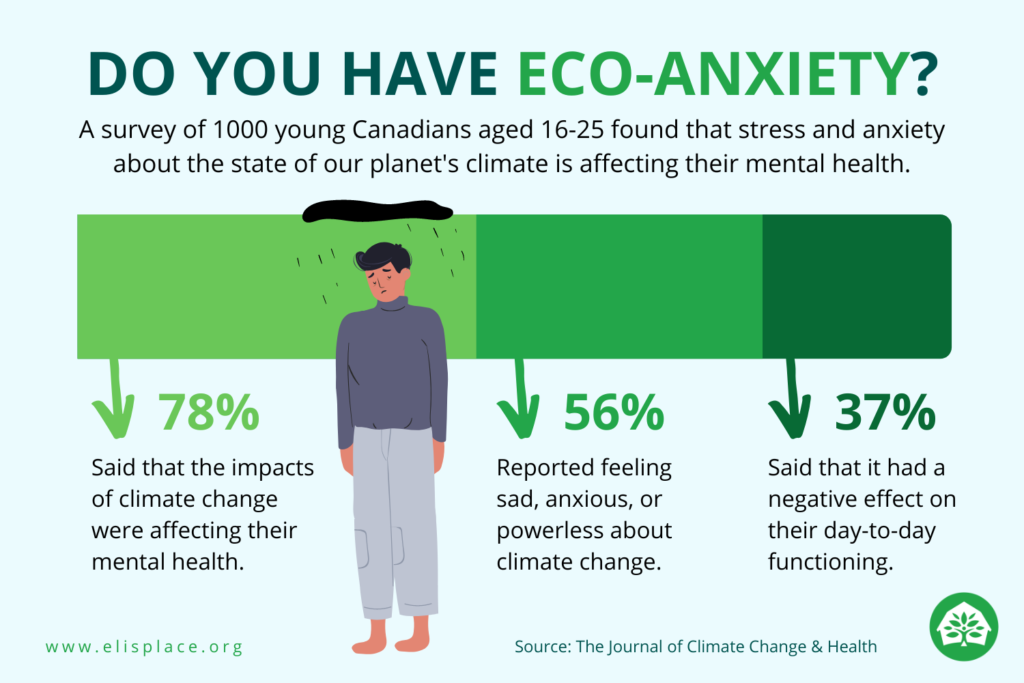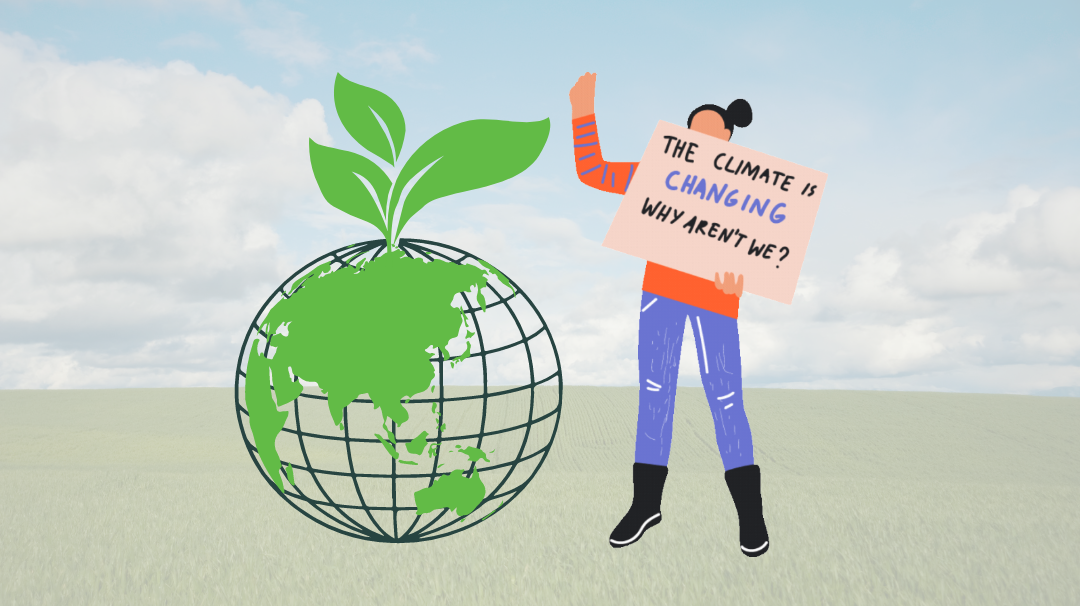An increasing number of Canadians are experiencing a phenomenon known as Eco-Anxiety; as environmental challenges persist, this condition has become more and more prevalent. It is also known as Climate Anxiety, Ecological Anxiety, or Eco Distress.
From conversations inspired by Earth Day, we’re presented with an opportune moment to consider how we can lead a more sustainable lifestyle, while actively contributing towards securing a brighter future for our planet.

What is Eco-Anxiety?
Eco-Anxiety is a persistent hopelessness about the state of our planet’s climate. It’s characterized by ongoing distress about the damage that has already been done, how the world is changing, our guilt about it, and the looming temperature change deadline. Eco-Anxiety has been extensively researched since 2007, with studies typically concluding that climate change-induced anxiety is a rational reaction.

When it comes to climate change, young people hold a unique position since they have made the least contributions to the crisis, will experience disproportionate impacts, and have limited opportunities to influence action. In a survey of 1000 young Canadians aged 16-25, 56% reported feeling sad, anxious, or powerless about climate change; 78% said that the impacts of climate change were affecting their mental health; and 37% said that it had a negative effect on their day-to-day functioning.

A Very Human Response
The human body’s natural survival mechanism is commonly known as the fight or flight response. It is triggered when faced with an actual or perceived threat, leading to the onset of anxiety. Climate change is a real and pressing issue that is significantly impacting our planet. In fact, climate anxiety proves the efficacy of our survival instinct. And it is pushing some of us to take proactive measures to reduce our carbon footprint and minimize our ecological impact. This heightened sense of urgency should be a source of motivation, propelling us toward a more sustainable future. However, political climate change deniers can also induce adverse despair effects.

Causes & Effects
The causes of Eco-Anxiety are complex and multifaceted. As climate change and its destructive consequences continue to affect and threaten our planet, it’s not surprising that more and more people are experiencing stress about the state of our environment.
Lived Experience
Having personal experience with the impacts of climate change, such as the loss incurred due to floods or wildfires, can understandably trigger anxiety regarding the ongoing harm inflicted on our planet. However, even less severe instances can cause emotional strain. Smoggy, rainy days can lead to decreased sunlight exposure, affecting serotonin production and increasing the likelihood of seasonal depression and other mood disorders.
News Coverage
Media coverage regarding climate change and its destructive consequences has further fueled feelings of despair and hopelessness about the state of the planet.
Feelings of Guilt
The awareness of one’s own environmental impact exacerbates Eco-Anxiety. This leads to feelings of guilt and shame, especially when coupled with a lack of eco-friendly habits.

Understanding the Symptoms of Eco-Anxiety
As the impacts of climate change become more apparent and alarming, individuals are experiencing a range of emotions about the future of our planet:
- Anger: Eco-Anxiety can lead to bitterness, particularly towards those who do not share the same concerns about climate change. These feelings can cause strained relationships with friends, family, or colleagues.
- Guilt: Individuals with Eco-Anxiety may feel guilty about their own carbon footprint, even if they are taking steps to reduce their impact on the environment. This guilt can lead to a sense of despair and an inability to take action.
- PTSD: Those who have experienced the damaging effects of climate change, such as natural disasters or loss of habitat, may develop PTSD as a result. This can cause flashbacks, anxiety, and avoidance behaviours.
- Fatalistic thinking: Eco-Anxiety can lead to a sense of hopelessness about the future, resulting in fatalistic thinking. Individuals may feel that their actions are meaningless and that the world is beyond repair.
- Depression or sadness: Feelings of depression or sadness are common in those with Eco-Anxiety. These emotions may stem from a sense of helplessness, sorrow, or loss of connection with the natural world.
Eco-Anxiety may also contribute to other mental health issues such as trouble sleeping, changes to appetite, and difficulty concentrating.
Understanding the symptoms of climate anxiety is essential in recognizing and addressing this issue, as it can affect not only the individual’s mental health but also their ability to act towards mitigating the impacts of climate change.

Managing Eco-Anxiety
Although climate change is a huge issue and can sometimes feel impossible to overcome, there are steps you can take that are good for both the planet and your personal mental health. These include:
Evaluate Your Personal Habits
Consciously adopting a more sustainable lifestyle can improve your sense of self and civic duty. It may even inspire others to adopt greener habits. Choosing activities such as biking or walking instead of driving will not only lower your carbon emissions but can also have positive effects on physical and mental health.
Connect With Your Community
Connecting with others who share in the mandate to protect our planet is good for your mental health. Consider volunteering for an environment-focused nonprofit, or participate in a community trash pickup or tree planting event. This will improve your emotional well-being while increasing hope and optimism.
Acknowledge Your Feelings
Exploring and talking about your feelings is healthy. For severe cases of climate anxiety therapy can be beneficial. Online tools such as Hold This Space can also help you explore your feelings about climate change and help you to take positive action.

In Some Cases, Therapy Can Help
Although Eco-Anxiety is not yet recognized in the DSM 5, the diagnostic tool used by clinicians to treat mental illness, mental health professionals agree that it is taking an emotional toll on many. Taking action to address climate change is important, but it can leave one feeling burnt out with not enough time or energy for self-care.
If you are struggling with the effects of Eco-Anxiety, a good therapist can help you to:
- Work on self-care and self-compassion.
- Develop coping strategies and skills.
- Address anxiety and depression.
- Design a personalized self-care program.
Ecotherapy is an emerging approach to mental health and climate anxiety. Highlighting the healing benefits of nature and the importance of not only nurturing the planet but also your own connection to it.

Conclusion
Although Eco-Anxiety is a relatively new condition it is very real and directly connected to the threat of climate change. Taking steps to preserve our environment is not only good for the planet, but is also important for our mental health.
Want to further your knowledge? Britt Wray is a Canadian researcher who explores the psychological and emotional impacts of the climate crisis. Eli’s Place recommends her recent book Generation Dread.
Eli’s Place will be a rural, residential treatment program for young adults with serious mental illness. To learn more about our mission and our proven-effective model click here.




